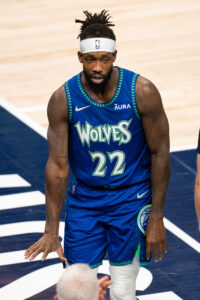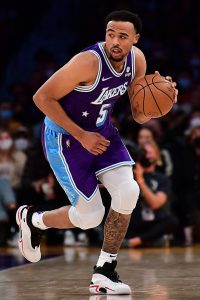This is the tenth installment in our series breaking down the major trades of the 2022 offseason. As opposed to giving out grades, this series will explore why the teams were motivated to make the moves. Let’s dive into a deal between the Lakers and Jazz…
On August 25, the Jazz traded Patrick Beverley to the Lakers in exchange for Talen Horton-Tucker and Stanley Johnson. Both Beverley and Johnson are on expiring deals, while Horton-Tucker has a player option for 2023/24.
The Lakers’ Perspective:
Marc Stein reported last week that the Lakers were initially reluctant to trade Horton-Tucker for Beverley as the front office was emphasizing youth and athleticism to revamp the roster after a disappointing ‘21/22 season that saw L.A. go 33-49 and miss out on the postseason. However, after LeBron James signed an extension, the team felt more comfortable making a win-now move to improve its roster.
Horton-Tucker is still just 21 years old, so he certainly has some untapped upside. The problem is, while he possesses some unique attributes, he needs the ball in his hands to be most effective on offense, and with ball-dominant players like James and Russell Westbrook on the roster, those opportunities were always going to be limited.
Complicating matters further is the fact that Horton-Tucker has been a poor outside shooter to this point (26.9% on three-pointers last season, 27.6% for his career), which hurt the team’s offensive spacing. He has the tools to be a good defender, but he was inconsistent on that end as well, which isn’t unusual for a young player.
Johnson was mainly included in the deal for salary-matching purposes, as the Lakers needed to add another $75K to Horton-Tucker’s salary to make the trade legal. He played with good energy and effort last season, but he’s a very limited offensive player who is about league-average defensively, so it’s not like he’ll be sorely missed.
 At 34 years old, Beverley is probably past his peak, but he’s certainly a short-term upgrade and a much better fit for the way the Lakers’ roster is constructed. He’s the exact type of guard who has typically thrived alongside James throughout his career, fitting the mold of a three-and-D player who doesn’t need the ball to be effective.
At 34 years old, Beverley is probably past his peak, but he’s certainly a short-term upgrade and a much better fit for the way the Lakers’ roster is constructed. He’s the exact type of guard who has typically thrived alongside James throughout his career, fitting the mold of a three-and-D player who doesn’t need the ball to be effective.
Beverley certainly isn’t the most talented scorer, with a career average of 8.8 points per game. But while he has his share of limitations on offense, he’s self-aware and typically doesn’t try to do too much, which is a valuable trait in a role player.
Beverley holds a career mark of 37.8% from beyond the arc, which is above average, and he’s even better from the corners, nailing 40% of those shots in his career. Corner threes are particularly important for floor spacing, so he should help in that regard.
Beverley also takes care of the ball, posting a 3.54-to-1 assist-to-turnover ratio in ’21/22, and is a tenacious offensive rebounder, creating extra possessions seemingly out of nowhere.
Defense has been Beverley’s calling card throughout his career and is the main reason why he’s about to enter his 11th NBA season. He has been selected to three All-Defensive Teams, the last coming in ’19/20, and though he isn’t quite as good as he once was, he’s still a major backcourt upgrade on that end.
Beverley also brings a relentless energy, effort, toughness and competitiveness that’s hard to quantify with stats, but is certainly impactful. That’s part of the reason why his teams have made the postseason in eight of his ten seasons.
A hard-nosed (at times reckless) playing style has led to Beverley sustaining several injuries, which has to be a significant concern for the Lakers after having James and Anthony Davis miss significant chunks of the last two seasons. Over the past five years, Beverley has appeared in just 235 of a possible 390 regular season contests, which is just over 60%.
Beverley’s expiring deal will pay him $13MM in ‘22/23, and the Lakers will hold his Bird rights, so they’ll be able to go over the salary cap to re-sign him next summer if both parties are amenable to that arrangement.
The Jazz’s Perspective:
Prioritizing minutes for an aging veteran when your team is in the midst of a full-fledged rebuild — a direction made even more evident by trading Donovan Mitchell to Cleveland — doesn’t make sense, and the Jazz realized that pretty quickly, moving on from Beverley less than two months after landing him in the Rudy Gobert blockbuster with Minnesota.
That’s not to say Utah didn’t value Beverley, but he’s a player who actually helps you win games, and the Jazz appear to be trying to lose as many games as possible next season to get the best chance of landing a top prospect like Victor Wembanyama.
What does make sense is taking an upside swing on a developmental prospect like Horton-Tucker, who was one of the youngest players in his draft class (46th overall pick in 2019). Now entering his fourth season, Horton-Tucker is still younger than several incoming rookies, including No. 14 overall pick Ochai Agbaji, whom the Jazz just acquired in the Mitchell deal.
As previously mentioned, Horton-Tucker (also known as THT) has some unique qualities. Standing 6’4″ and weighing 234 pounds, he has a broad-shouldered, strong frame. He also possesses a freakish 7’1″ wingspan, and the combination of his strength and length allows him to do some things that other players are not physically capable of.
 Just because he was a poor fit with the Lakers doesn’t mean he lacks talent, and Horton-Tucker certainly has a chance to be a better player than Beverley ever was. The Jazz are betting that giving him a runway for a bigger role might bring out the best in him, allowing Utah to reap the long-term rewards.
Just because he was a poor fit with the Lakers doesn’t mean he lacks talent, and Horton-Tucker certainly has a chance to be a better player than Beverley ever was. The Jazz are betting that giving him a runway for a bigger role might bring out the best in him, allowing Utah to reap the long-term rewards.
Horton-Tucker is not a three-and-D player, but that’s what the Lakers needed him to be, so that’s the role they asked him to play. He is, however, a skilled play-maker, showcasing a knack for getting into the lane with an array of behind-the-backs, crossovers and spin moves. He’s particularly adept at changing pace on the fly, which is a difficult skill to teach.
A solid but unspectacular athlete, Horton-Tucker’s primary attribute at this point is his ability to get to his spots, especially around the basket, though he hasn’t been the best at converting when he does — he shot 57% at the rim last season, which was in the 31st percentile of all players, per DunksAndThrees.com. Like Beverley, Horton-Tucker is a Chicago native who plays with a physical edge and a level of fearlessness that’s impressive to watch.
He has shown some nascent ability as a passer as well, especially off a live dribble, and could realistically average five-plus assists for Utah considering the lack of quality passers on the roster, especially if Mike Conley is traded. Horton-Tucker is also a solid off-ball cutter, something he was able to showcase a bit more a couple of years ago when playing with Marc Gasol, an excellent passing center who could space the floor.
Horton-Tucker needs work defensively — he has the physical tools to be effective, but he’s prone to mistakes, especially off the ball. He’s often slow to rotate as a help defender and is a little reach-happy on the ball, but those are fixable errors.
THT has an $11MM player option for ‘23/24, and there’s a reasonable chance that he picks it up, depending on how he performs next season. The Jazz will have his Bird rights if they’d like to keep him around.
The eighth pick of the 2015 draft, Johnson hasn’t developed into the player scouts thought he could be, and he’s unlikely to have much of a role for Utah. With the Mitchell deal complete, the Jazz will have 17 players on guaranteed deals, and that number needs to be cut down to 15 by the start of the regular season, so Johnson’s spot on the roster is far from secure.
Neither Horton-Tucker (-0.5) nor Johnson (-0.2) made much of an impact on winning last season, with both ranking in the bottom 100 in the league in value over replacement player, per Basketball-Reference. Beverley, meanwhile, recorded a career-best 1.7 VORP, good for 65th in the NBA.
There are several other advanced stats that indicate the same thing, with Beverley posting more win shares (4.1) than THT and Johnson combined (2.9). Beverley’s estimated plus/minus was +2.0, which ranked 68th in the league, per DunksAndThrees.com, while Horton-Tucker (-2.4, ranked 327th) and Johnson (-1.2, ranked 248th) were both net negatives by that metric. I could go on, but you get the point.
Ultimately, considering the Jazz are trying to lose in ’22/23 and the Lakers are trying to win, it was a logical trade for both sides.
 At 34 years old, Beverley is probably past his peak, but he’s certainly a short-term upgrade and a much better fit for the way the Lakers’ roster is constructed. He’s the exact type of guard who has typically thrived alongside James throughout his career, fitting the mold of a three-and-D player who doesn’t need the ball to be effective.
At 34 years old, Beverley is probably past his peak, but he’s certainly a short-term upgrade and a much better fit for the way the Lakers’ roster is constructed. He’s the exact type of guard who has typically thrived alongside James throughout his career, fitting the mold of a three-and-D player who doesn’t need the ball to be effective. Just because he was a poor fit with the Lakers doesn’t mean he lacks talent, and Horton-Tucker certainly has a chance to be a better player than Beverley ever was. The Jazz are betting that giving him a runway for a bigger role might bring out the best in him, allowing Utah to reap the long-term rewards.
Just because he was a poor fit with the Lakers doesn’t mean he lacks talent, and Horton-Tucker certainly has a chance to be a better player than Beverley ever was. The Jazz are betting that giving him a runway for a bigger role might bring out the best in him, allowing Utah to reap the long-term rewards.